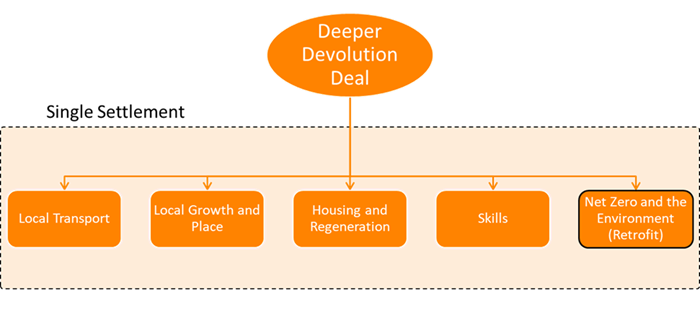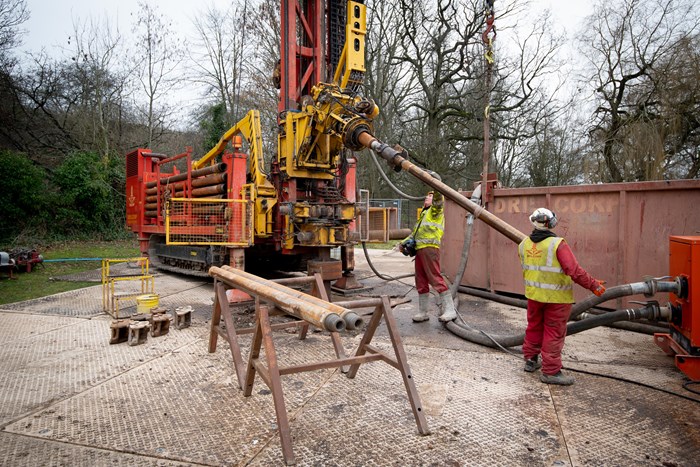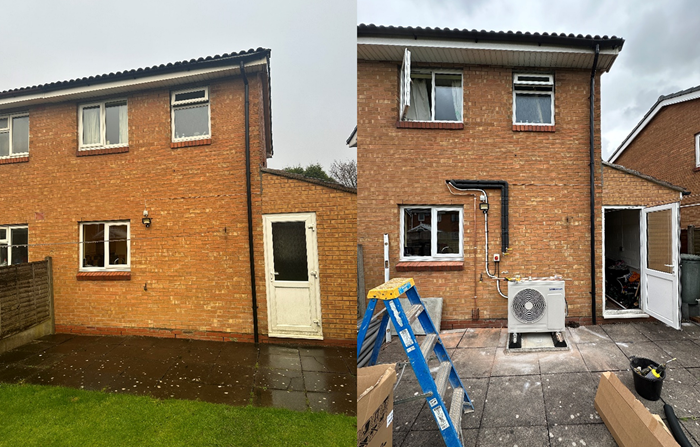Energy Capital and the West Midlands Combined Authority have been working to demonstrate the important contributions local and combined authorities can make in securing green growth and progressing net zero carbon ambitions: identifying where devolved powers could help to achieve these more effectively. The WMCA, through Energy Capital, is trailblazing a partnership approach with central government to align national targets, missions, and objectives with regional priorities.
In early 2023, the WMCA successfully negotiated the landmark Deeper Devolution Deal, as one of only two trailblazer regions in England at the time—the other being Greater Manchester Combined Authority. The Devolution Deal seeks to devolve responsibility for a clear set of policies under five strategic pillars, supporting West Midlands growth and prosperity. The pillars are shown below:

Underpinning the deal will be a single department-style funding settlement (Single Settlement) for investing into regional activities within each pillar. The Single Settlement will allow the Combined Authority to target funding into local priority areas, try new innovative policy approaches, drive forward the local economy and be held accountable for delivery across key sectors. The Single Settlement will cover an entire Spending Review period, setting a three-year budget with two-year review cycles and starting in 2025.
The Trailblazer Devolution Deal, and following Memorandum of Understanding (MoU) for the Trailblazing Single Settlements for WMCA and GMCA (late 2023) documents, set out the framework for devolving energy, net zero and retrofit activities. Each commitment will help to drive a more joined-up and effective approach to delivering on priorities for the West Midlands and our Regional Energy Strategy.
Strategic Energy System Planning and Local Area Energy Planning
The Government recognise the strategic role WMCA can play in planning a future net zero energy system through convening local authorities, energy infrastructure providers, energy users and other key stakeholders. This will include considering the role of Local Area Energy Planning (LAEP) to support net zero delivery and network investment planning activities. The Government and Ofgem are supportive of the West Midlands continuing to develop LAEP and spatial planning for understanding the most efficient routes to a net zero energy system, as well as trialling novel approaches to inform investment planning. This will require continuing to work closely with Ofgem, the Government and wider energy system stakeholders across the region to develop plans and deliver network investments.
In line with our objectives to helping overcome the energy crisis and develop a smarter, more integrated and low-carbon energy system, the Government and Ofgem are driven to continue network operator’s engagement with the Combined Authority and other local stakeholders to inform their business plans so that they align with local needs and targets.

Clean Heat
There is a strong role that WMCA and local authorities will have to play in regionally co-ordinating heat network zones and in decarbonising space heating and hot-water-using infrastructure more generally. This role will become even more formalised as Central Government bring forward their heat network zoning proposals in England. The devolution deal seeks to integrate heat network zones with wider LAEP and spatial planning, which will help to develop and accelerate the West Midlands’ decarbonisation journey and work in lockstep with other devolved net zero and energy system planning activities.
Industrial Decarbonisation
With key industrial regions supporting thousands of local jobs, like in the Black Country, the West Midlands is recognised for its strong economic position in manufacturing and industrial processes. However, many of these businesses are acutely exposed to energy price fluctuations, and industrial decarbonisation activity is recognised in the devolution deal as a key strand to relieving these pressures and transition to a net zero energy system. This includes a range of funding opportunities across a range of sectors and clusters (defence, aerospace, energy, automotive, etc.), as well as coordination of Energy Infrastructure and Systems planning.
Energy Efficiency and Retrofit
The Government has committed to piloting a regional, allocative approach to funding net zero energy efficiency work through the deal and single settlement. This will include, but not be limited to, building retrofit. Agreement to the scope of devolution, allocation approach, quantum of funding, scope of funding, single outcomes and accountability frameworks, and others, will be agreed before April 2025, and in some policy areas, at a later date.

Buildings Retrofit
WMCA is currently developing a funding allocation model aimed at promoting a place-based approach to building retrofit, and providing long-term confidence to the supply chain and sector. Our aim is to create a more flexible delivery model that can develop capacity across the region, stimulate innovation and increase the scale of investment and market activity.
As laid out in the MoU, the devolved retrofit pilot is likely to include so-called ‘functional responsibilities’ from April 2025 for the following items:
- Retrofitting social housing; and all other residential buildings focusing on households at risk of fuel poverty in the local area. (Funding is likely to be sourced from the ‘parent schemes’, Social Housing Decarbonisation Fund (SHDF) and Local Authority Retrofit Scheme (LARS));
- Decarbonising public sector buildings managed by the MCAs or their constituent authorities and, where deemed reasonably practicable by the DESNZ Secretary of State, by wider public sector actors. (Funding is likely to be sourced from the parent scheme, Public Sector Decarbonisation Scheme (PSDS)).
Alongside these functional responsibilities, there will be a single outcomes framework, set and agreed with the Government, that will detail the requirements and conditions WMCA will be held to account to for continual devolution of funding. These will include, but not be limited to:
- The type and level of greenhouse gas emission reductions that must be achieved.
- Fuel poverty targets.
- The primary objective of the devolved scheme.
- Value for money.
- Match-funding or private-sector leverage requirements.
- Quality standards for the work performed.
- Monitoring, evaluation and audit requirements.
Minimum Energy Efficiency Standards (MEES)
The Government are exploring the potential benefits of supporting the regional setting of MEES and boosting of standards enforcement for socially and privately rented properties above the national standard, subject to regulatory and legislative changes. This would be a powerful tool for aligning regional energy efficiency targets with available devolved funding streams and regional net zero targets.
Finance
Leveraging greater levels of private finance to drive retrofit and energy efficiency delivery is key to reaching our regional and national net zero targets. The devolution agreement lays the foundation for joining up the retrofit pilot with the wider Energy Capital work on developing financial instruments and innovative funding models for attracting private finance—namely through the Local Net Zero Accelerator (LNZA) programme funded by DESNZ.
Advice
The Government have committed to working with WMCA to develop more comprehensive, independent and joined-up advice services for retrofit and energy efficiency upgrades to homes and businesses. This regional advice service will have to knit together currently available local and national advice services, including the national phoneline, new government energy advice website, combined authority services (Business Energy Advice Service), local net zero hub work, and others.